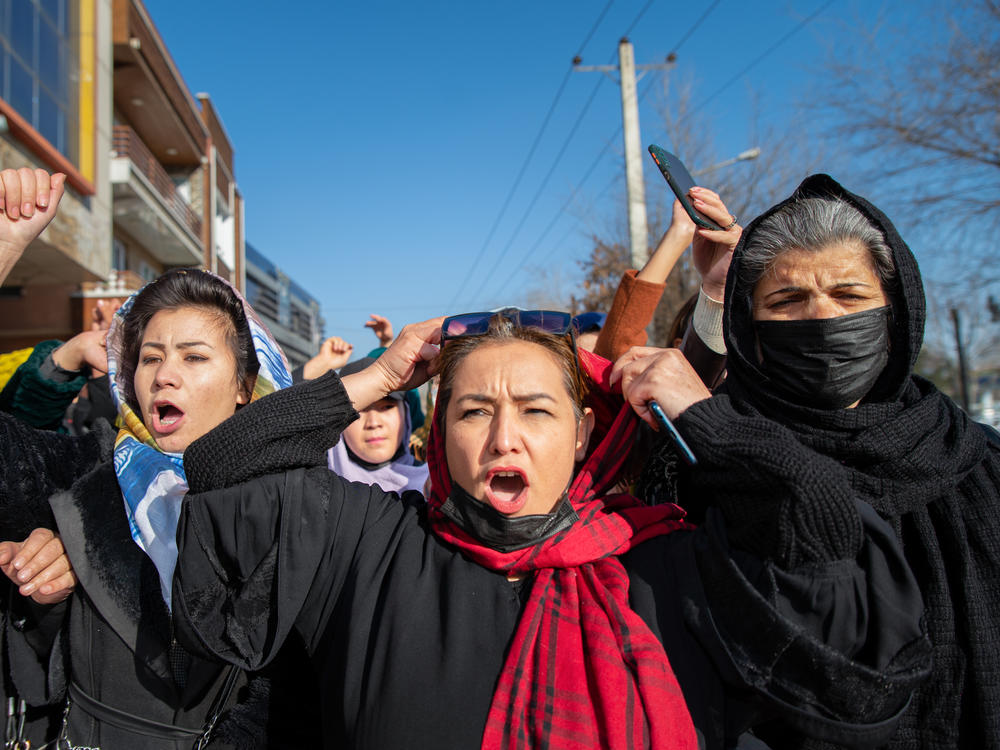Section Branding
Header Content
Taliban expels female teachers from some schools. So who will teach the girls?
Primary Content
Two days ago the Taliban government in Afghanistan issued an edict banning female students from attending university, expanding on an earlier ban on secondary school for girls.
With that, the highest level of education an Afghan girl could attain is grade 6, the last year of elementary school.
But on Thursday, it appeared the newly announced ban may be even more extensive. This week, Taliban officials kicked out women working in schools, according to interviews with seven female employees in different Afghan schools. It's unclear how extensive the ban will be; it was largely reported in one swath of Kabul.
The targeted women are largely tasked with teaching Afghan girls from grades one to six. So ordering them home raised concerns that the Taliban intends to ban all formal schooling for girls by banning their teachers.
All the employees who spoke to NPR requested anonymity, fearing they'd be identified by Taliban officials, who have grown increasingly intolerant of dissent in recent months. Some of the employees said their principals informed them that they had to leave. Others said Taliban security forces were waiting at the door of their schools and ordered them home. In some cases the principals were women and they too were ordered to leave.
In one instance, an educator said that Taliban security forces burst into his school, which has both girls (grades 1 to 6) and boys (through high school) in segregated classes. Women working there were forced to leave at gunpoint. He said he and other male staff were warned not to allow the women back into school – or else.
Afghan schools are largely closed for winter – so there were no classes taking place during these actions.
But there were women employees in schools across Kabul – including teachers, principals and other administrators – who were marking exams and undertaking routine administrative tasks.
One school principal said that she received a notification via the messaging service WhatsApp from Taliban officials ordering her to send home all women working in the school until further notice – and that she had to go, too. "It doesn't make sense," she said, sobbing.
"We don't have anywhere to go to ask for an explanation," she said – because women are not welcome in many Taliban-run government ministries. "Now we just have to accept what comes. You can't even think of asking for a reason."
But there are mixed signals. In a message sent to school principals on the messaging service WhatsApp, one ministry of education official said the "mujahideen" or Taliban security forces, who ordered female employees to go home had acted on a "misunderstanding."
"Until there's an official letter," the notice said, "they are allowed to continue their jobs and come to school."
But some educators were not taking any chances.
A woman who runs an Islamic seminary, or madrassa, for teenage girls, quickly removed a sign advertising her classes from the street below.
She told NPR she was scared she would get in trouble for teaching about Islam to girls. She requested anonymity, fearing identification. "This is my main source of income," she said. "I'll have to secretly teach girls the Qur'an."
As some women were kicked out of their places of employment, others protested.
About two dozen Afghan women held a rare march to demonstrate against the ban on their education. Taliban security forces blanketed the area, patrolling with Humvees, men on foot, men on motorbikes, and even fire trucks. During previous protests by women to demand their rights, Taliban security forces opened fire over the heads of the women to disperse them. There was no violence this time – but at least two protesters and a journalist were briefly detained.
Afghan activists shared footage online of male medical students storming out of their classrooms in solidarity with their female colleagues, who have now been suspended from college. Another shared footage of men and women gathered in apparent protest outside another university.
The images were striking because they were so rare – Afghan men have been noticeably absent from protests and demonstrations supporting their sisters' right to an education. But – as many Afghans note – the Taliban forces cracked down much harder, and much more violently, against men who have resisted the group.
And in the first public statement by the Minister of Higher Education since the ban on women attending higher education was issued, Sheikh Neda Mohammad Nadeem insisted that the move was temporary, blaming the female students for their own predicament.
In a press conference he said that female students did not respect the Taliban's rules on modesty – which demand a full black face veil, headscarf and long loose robe. "Women dressed as if they were going to weddings," he complained.
He said women were mixing with men and were traveling to distant universities without male guardians. Nadeem added that some women were being allowed to study subjects not compatible with Afghan culture or Islam, like engineering and agriculture.
Nadeem said that until further notice, women were suspended from public and private universities, and even from private tuition centers where girls receive informal education, mostly English and math lessons.
He said the Afghan government was "working on solving issues within the framework of Islamic law." However, the same government has insisted for over a year that they are working to resolve unspecified issues that have kept girls out of high school.
In the statement, the minister did not mention female teachers being kicked out of their schools nor whether girls could continue attending primary schools. In the absent of any comment addressing these concerns, parents, teachers and the girls themselves are left not knowing what the future holds.
Copyright 2022 NPR. To see more, visit https://www.npr.org.

